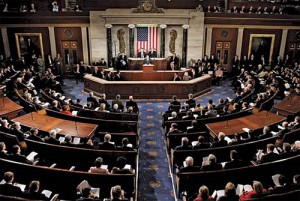Getting Congress Up To Date With American Secularism

As most nonreligious Americans know, this current Congress isn’t the biggest supporter of church-state separation or atheists in general. Bills favoring religious institutions or exempting them from discrimination laws are quite commonplace, as are attempts to officially proclaim that America is a “Judeo-Christian” nation.
Thankfully, government hostility towards disbelief and those who embrace it is about to change. I recently had the pleasure of participating in the first ever Congressional briefing on American secularism, at which over 50 staffers from various Representatives’ offices attended. It was a big day for the nonreligious movement in America, as it represented the first time that we were able to speak to so many of our government officials and their staff at the same time. Not since 2010’s White House briefing has atheists had such a big stage to discuss what matters to them with government officials.
Typically, nonreligious advocates meet with a few staffers or government officials at a time to discuss some of the issues that the movement is concerned about. At this briefing, hosted by the Secular Coalition for America, we had a chance to familiarize numerous Congressional offices with the nonreligious community and many of the issues that we are concerned about.
The briefing included a panel composed of several key movement figures, including American Humanist Association President David Niose and Harvard University Humanist Chaplain Greg Epstein.
Niose informed the staffers of the history of the contemporary nonreligious movement, explaining how it went from being primarily a philosophical undertaking to an identity-based advocacy movement that works to ensure that our government remains secular treats nonreligious Americans equally. Niose mentioned the changing makeup of the secular movement, which now has a larger appeal because of its more youthful and racially diverse composition. Niose also cited a study which showed that a fifth of Americans don’t state a religious identity when asked, and that a majority of Americans think politicians should keep their faith out of their public-policy decisions.
Overall, the message to legislators and their staff was a simple one: nonreligious Americans just want to be treated equally. Like many minority groups, we face discrimination, and our government has unfortunately failed to protect us or even to consider the wants and needs of our community when making laws that affect us.
On issues such as government funding of faith-based aid organizations that discriminate in hiring based on a lack of religious belief to the simple act of opening and closing each session of Congress with a prayer, nonreligious Americans are routinely ignored and their opinions are marginalized by those in power. With this Congressional briefing and the continued advocacy by groups such as the American Humanist Association, we are showing those in power that we are willing to fight for a seat at the table when decisions are made about church-state separation and the rights and liberties of the nonreligious.
Hopefully, this will be the first of many Congressional briefings hosted by the secular community. Our movement is growing and becoming more politically influential, and politicians are definitely beginning to notice. As a movement, we must continue to oppose those who wish to mix politics with religion and support those brave politicians that are courageous enough to be an open ally to the nonreligious community. We must also do the best we can to educate politicians about our community and what we do and don’t believe in.
